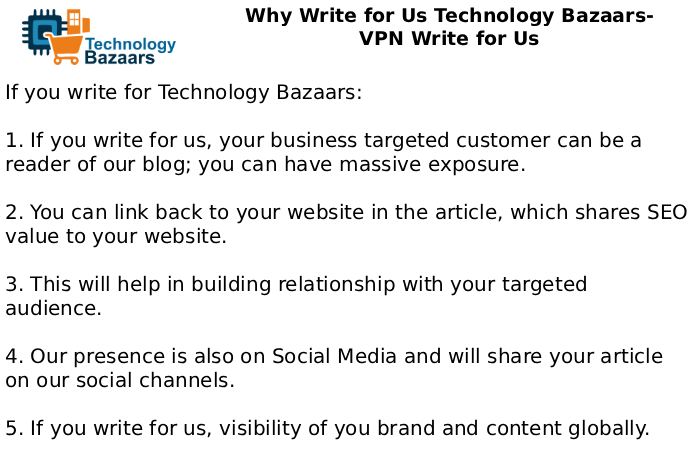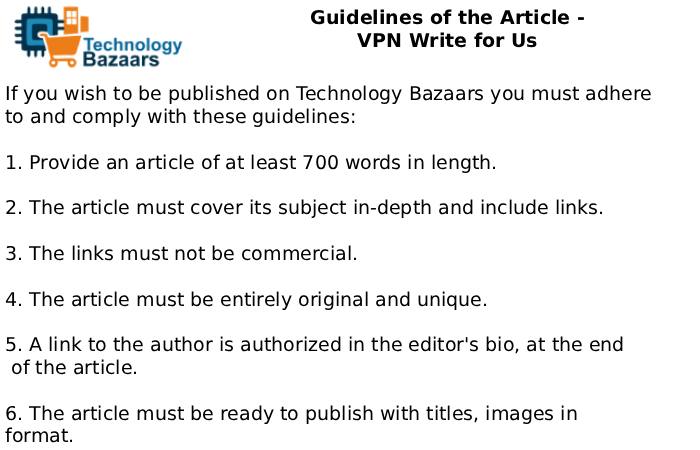VPN Write for Us

VPN Write for Us : A VPN (Virtual Private Network) is a influential tool that enhances online privacy, protects sensitive data, and provides secure. internet access In today’s interconnected world, online privacy and data security are more critical than ever. One of the best ways to protect yourself and improve your online experience is to use a VPN (Virtual Private Network). Whether you want to protect your data, bypass geo-restrictions, or stay anonymous online, a VPN is invaluable.
This guide explains what a VPN is, how it works, and the dissimilar types of VPNs available in 2025.
How to Submit Your Articles?
To submit your article at contact@technologybazaars.com
What Is a VPN
A VPN (Virtual Private Network) is a knowledge that makes a secure, encrypted connection between your device and the internet. It acts as a private channel for your internet traffic, preventing hackers, internet service providers (ISPs), and government agencies from tracking your activities. When using a VPN, your IP speech is masked and your online movement is routed finished a remote server, creation it difficult for anyone to track your online activity.
Key Benefits of Using a VPN:
- Privacy Protection: A VPN hides your IP address, ensuring the privacy of your online activities and actions.
- Security on Public Networks: Public Wi-Fi networks are often unsafe, but a VPN encrypts your connection, making internet browsing safer in networks like coffee shops or airports.
- Bypass Geo-Restrictions: A VPN allows you to access content that may be blocked in certain regions (such as streaming platforms, social media, etc.).
- Avoid Bandwidth Throttling: Some Internet Service Providers (ISPs) limit your connection speed when streaming or gaming. A VPN permits you to bypass this restriction, ensuring faster internet speeds.
- Access Resources for Remote Work: A VPN provides secure access to private networks, making it ideal for businesses and remote workers.
How Does a VPN Work
A VPN creates an encoded tunnel between your device and a remote server. Here’s a simplified process:
- Establishing a connection: When you activate a VPN on your device, it connects to the VPN provider’s server.
- Encryption: A VPN encrypts your data (information, files, web traffic), preventing it from being intercepted by anyone, whether a hacker on the same Wi-Fi network or an organisation trying to track your online activities.
- Traffic redirection: Your device’s internet traffic is routed through a VPN server, which can be located in any country. This makes it appear you’re browsing from the server while hiding your real IP address.
- Decryption: Once your data spreads the VPN server, it’s decrypted and sent to its terminus (e.g., a website, app, or service). Any response from the server is sent back to you through the encrypted tunnel.
End-to-end encryption ensures your sensitive data stays private and your location remains anonymous.
Why Write for Technology Bazaars – VPN Write for Us

Related Terms to VPN
- Virtual Private Network
- Nord VPN
- Proton VPN
- VPN Server
- VPN for PC
- VPN for MAC
- Opensource IPsec
- VPN Server
- Gnome VPN
- Express VPN
- Private Network
- Proxies
- Operating System
- Windows
- macOS
- Public Networks
- Routing
- Networking
- Local Network
- LAN
- WAN
- Proxy Servers
- Dial up Modem
- IPv4
- IPv6
- Intranet
- OSI Layer
- VPN Security
- Internet Protocol Security
- OpenConnect
- DTLS
- MMPE
- STTP
- Virtual LAN
- VPLS
Search Terms for VPN Write for Us
- Big Data Write for Us
- Software Write For Us
- Cloud Computing Write For Us
- Computer Write for Us
- VOIP Write for Us
- Data Centre Write for Us
- Web Design Write For Us
- CCleaner Write For Us
- JSON write for us
- Finance write for us
- IT Automation write for us
- Certification write for us
- Memory Card write for us
- Adobe writes for us
- IVR write for us
- Motherboard write for us
- Games write for us
- Projector write for us
- Chromebook write for us
Guidelines of the Article – VPN Write for Us

you can send your article to contact@technologybazaars.com
